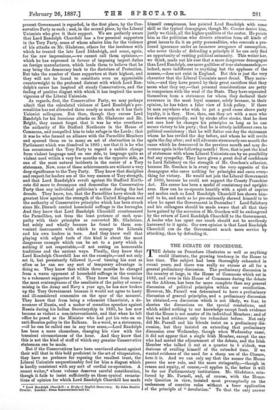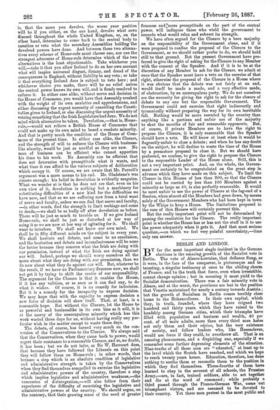THE DEBATE ON PROCEDURE.
THE debate on Procedure illustrates as well as anything could illustrate, the growing tendency in the House to lose time. The subject had been thoroughly exhausted in recent years, and there was really no excuse at all for a general preliminary discussion. The preliminary discussion in the country at large, in the House of Commons which sat in 1882, and even in this House of Commons during the debate on the Address, has been far more complete than any general discussion of political principles within our recollection. However, Mr. Parnell was determined to have a preliminary discussion of general principles, and a preliminary discussion he obtained,—a discussion which is not likely, we fear, to shorten the discussions on the special resolutions, and which added nothing to our knowledge except fresh evidence that the House is not master of its individual Members ; and of that we had evidence only too redundant before. Not only did Mr. Parnell and his friends insist on a preliminary dis- cussion, but they insisted on extending that preliminary discussion over Wednesday, though when Wednesday came, it did not appear that a single Irish Member, except the one who had moved the adjournment of the debate, and the Irish Member who talked it out at a quarter to 6 o'clock, was desirous of availing himself of the extended time. If we wanted evidence of the need for a sharp use of the Closure, here it is. And we can only say that the sooner the House passes the new rule, and the more stringently,—though in reason and equity, of course,—it applies it, the better it will be for our Parliamentary institutions. Mr. Gladstore, rein- forced by Mr. Parnell, and, of course, with the Home- rule Question in view, insisted most peremptorily on the uselessness of coercive rules without a freer application of the principle of "devolution." To that the only answer
is, that the more you devolve, the worse your position will be if you either, on the one hand, devolve what sows discord throughout the whole United Kingdom, or, on the other hand, determine to come back to the central body to sanction or veto what the secondary Assemblies holding the devolved powers have done. And between these two alterna. tives every scheme of Home-rule must choose one, nor can the strongest advocates of Home-rule determine which of the two alternatives is the least objectionable. Take whichever you will,—take it that you allow Ireland to do on her own account what will inspire universal disgust, dismay, and dread of the consequences in England, without liability to any veto ; or take it that everything Ireland does is subject to veto here ; and whichever choice you make, there will be no relief unless the central power knows its own will, and is firmly resolved to enforce it. In either case alike, without nerve and decision in the House of Commons, you would have that Assembly crushed with the weight of its own anxieties and apprehensions, and either discussing the urgent necessity of cancelling the Consti- tution given to Ireland, or else discussing the urgent necessity of vetoing something that the Irish Legislature had done. We do not mind which alternative be taken. Devolution,—that is, Home- rule,—would not relieve a British House of Commons that could not make up its own mind to beard a resolute minority. And that is pretty much the condition of the House of Com- mons of the present time. In either case alike, the Closure, and the strength of will to enforce the Closure with business- like alacrity, would be just as needful as they are now. No man of business can be efficient who cannot apportion his time to his work. No Assembly can be efficient that does not determine with promptitude what it wants, and what time it can afford to the various subjects of deliberation which occupy it. Of course, we are aware that Mr. Parnell's argument was a mere means to his end. Mr. Gladstone's was sincere enough ; his belief in devolution is evidently sanguine. What we wonder at is that he does not see that, even on his own view of it, devolution is nothing but a machinery for substituting difficulties of a new kind for the difficulties we have now, and that as we are suffering now from a total want of nerve and faculty, unless we can find that nerve and faculty, —in other words, find the strength to limit verbiage and come to deeds,—we shall be as badly off after devolution as before. There will be just as much to trouble us. If we give Ireland Home-rule, we shall be just as disturbed at her way of using it as we are now at her way of agitating for it. We shall want to interfere. We shall not know our own mind. We shall be in fifty different minds on the subject in every year. We shall hesitate and debate, and come to no conclusion, and the hesitation and debate and inconclusiveness will be none the better because they concern what the Irish are doing with our permission, instead of what the Irish are doing against our will Indeed, perhaps we should worry ourselves all the more about what they are doing with our permission, than we do now about what they do against our will. But, whatever be the result, if we have no Parliamentary firmness now, we shall not get it by trying to shift the centre of our responsibility. The argument for the Closure is that it enables the House, if it has any volition, or as soon as it can find any, to do what it wishes. Of course, it is no remedy for indecision. But it is a remedy for the incapacity to express decision. We may hope that with the capacity to express decision a new force of decision will show itself. That, at least, is a reasonable hope. But without the Closure, let the House be as powerful and businesslike in its own bias as it will, it is at the mercy of the unscrupulous minority which has this week wasted three days for us, without having really any par- ticular wish in the matter except to waste those days. The debate, of course, has turned very much on the con- version of the Conservatives to the Closure. We always said that the Conservatives, when they came back to power, would regret their resistance to a reasonable Closure, and so, no doubt, it has been ; but we do not infer, as Sir W. Harcourt does, that because they have followed the Liberals on this point they will follow them on Home-rule ; in other words, that because a step which is an absolute condition of legislative and administrative strength is taken by the Conservatives when they find themselves compelled to exercise the legislative and administrative powers of the country, therefore a step which implies legislative and administrative weakness,—the concession of disintegration,—will also follow from their experience of the difficulty of exercising the legislative and administrative powers of the country. We should arm, on the contrary, that their growing sense of the need of greater firmness and:more promptitude on the part of the central power. will indispose those who wield the government to concede what would relax and subvert its strength. We have often argued for the Closure by a bare majority on the responsibility of the Government alone, and if it were proposed to confine the proposal of the Closure to the Government, as we should rather prefer to do, we should hold still to that ground. But the present Government have pre- ferred to give the right of asking for the Closure to any Member with the consent of the Speaker. And if ibis to be at the discretion of any Member to ask for the Closure, we admit at once that the Speaker must have a veto on the exercise of that right, otherwise the proposal of the Closure in a House where it was obvious that the debate was not fairly at an end, would itself be made a mode, and a very effective mode, of obstruction, by an unscrupulous party. We do not ourselves see the necessity for giving the right to ask for the closure of debate to any one but the responsible Government. The Government could not exercise that right indiscreetly and tyrannically without preparing the way for its own inevitable fall. Nothing would be more resented by the country than anything like a partisan and unfair use of the majority to shut the mouths of fair and reasonable opponents. But, of course, if private Members are to have the right to propose the Closure, it is only reasonable that the Speaker should have a veto. He will know at least when it would be flagrantly unfair to close a debate ; and when he has any doubt on the subject, he will decline to waste the time of the House by a premature proposal to close it. But we should have preferred, we confess, to give the right to propose the Closure to the responsible Leader of the House alone. Still, this is not a very important point. And, on the whole, the Govern6 ment are certainly to be congratulated on the great step in advance which they have made on this subject. To limit the Closure in thin Houses of less than 200, so that the Closure could not be carried by less than 100 Members against a minority as large as 40, is also perfectly reasonable. It would be most unfair to use the power of Closure at the fag-end of Session, when almost all the Members had gone down, by means solely of the Government Members who had been kept in town by the Whips to keep a House. The limitations proposed in the ease of thin Houses will certainly prevent this.
But the really important point will not be determined by passing the resolution for the Closure. The really important point is whether the House has or has not the stuff in it to use the power adequately when it gets it. And that most serious question,—on which we feel very painful uncertainty,—time only can answer.



































 Previous page
Previous page